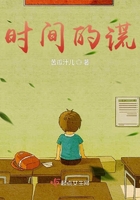By this language, partly, Cicero's feelings were altered, and partly, also, because Pompey made no great use of him. Although, indeed, he was himself the cause of it, by his not denying that he was sorry he had come, by his depreciating Pompey's resources, finding fault underhand with his counsels, and continually indulging in jests and sarcastic remarks on his fellow-soldiers. Though he went about in the camp with a gloomy and melancholy face himself, he was always trying to raise a laugh in others, whether they wished it or not. It may not be amiss to mention a few instances. To Domitius, on his preferring to a command one who was no soldier, and saying, in his defence, that he was a modest and prudent person, he replied, "Why did not you keep him for a tutor for or your children?" On hearing Theophanes, the Lesbian, who was master of the engineers in the army, praised for the admirable way in which he had consoled the Rhodians for the loss of their fleet, "What a thing it is," he said, "to have a Greek in command!" When Caesar had been acting successfully, and in a manner blockading Pompey, Lentulus was saying it was reported that Caesar's friends were out of heart; "Because,"said Cicero, "they do not wish Caesar well." To one Marcius, who had just come from Italy, and told them that there was a strong report at Rome that Pompey was blocked up, he said, "And you sailed hither to see it with your own eyes." To Nonius, encouraging them after a defeat to be of good hope, because there were seven eagles still left in Pompey's camp, "Good reason for encouragement," said Cicero, "if we were going to fight with jackdaws." Labienus insisted on some prophecies to the effect that Pompey would gain the victory; "Yes,"said Cicero; "and the first step in the campaign has been losing our camp."After the battle of Pharsalia was over, at which he was not present for want of health, and Pompey was fled, Cato, having considerable forces and a great fleet at Dyrrachium, would have had Cicero commander-in-chief, according to law and the precedence of his consular dignity. And on his refusing the command, and wholly declining to take part in their plans for continuing the war, he was in the greatest danger of being killed, young Pompey and his friends calling him traitor, and drawing their swords upon him; only that Cato interposed, and hardly rescued and brought him out of the camp.
Afterwards, arriving at Brundusium, he tarried there some time in expectation of Caesar, who was delayed by his affairs in Asia and Egypt. And when it was told him that he was arrived at Tarentum, and was coming thence by land to Brundusium, he hastened towards him, not altogether without hope, and yet in some fear of ****** experiment of the temper of an enemy and conqueror in the presence of many witnesses. But there was no necessity for him either to speak or do anything unworthy of himself; for Caesar, as soon as he saw him coming a good way before the rest of the company, came down to meet him, saluted him, and, leading the way, conversed with him alone for some furlongs. And from that time forward he continued to treat him with honour and respect, so that, when Cicero wrote an oration in praise of Cato, Caesar in writing an answer to it, took occasion to commend Cicero's own life and eloquence, comparing him to Pericles and Theramenes. Cicero's oration was called Cato; Caesar's, anti-Cato.
So also it is related that when Quintus Ligarius was prosecuted for having been in arms against Caesar, and Cicero had undertaken his defence, Caesar said to his friends, "Why might we not as well once more hear a speech from Cicero? Ligarius, there is no question, is a wicked man and an enemy." But when Cicero began to speak, he wonderfully moved him, and proceeded in his speech with such varied pathos, and such a charm of language, that the colour of Caesar's countenance often changed, and it was evident that all the passions of his soul were in commotion. At length, the orator touching upon the Pharsalian battle, he was so affected that his body trembled, and some of the papers he held dropped out of his hands. And thus he was overpowered, and acquitted Ligarius.
Henceforth, the commonwealth being changed into a monarchy, Cicero withdrew himself from public affairs, and employed his leisure in instructing those young men that would, in philosophy; and by the near intercourse he thus had with some of the noblest and highest in rank, he again began to possess great influence in the city. The work and object to which he set himself was to compose and translate philosophical dialogues and to render logical and physical terms into the Roman idiom. For he it was, as it is said, who first or principally gave Latin names to phantasia, syncatathesis, epokhe, catalepsis, atamon, ameres, kenon, and other such technical terms, which, either by metaphors or other means of accommodation, he succeeded in ****** intelligible and expressible to the Romans. For his recreation, he exercised his dexterity in poetry, and when he was set to it would make five hundred verses in a night. He spent the greatest part of his time at his country-house near Tusculum. He wrote to his friends that he led the life of Laertes either jestingly, as his custom was, or rather from a feeling of ambition for public employment, which made him impatient under the present state of affairs. He rarely went to the city, unless to pay his court to Caesar. He was commonly the first amongst those who voted him honours, and sought out new terms of praise for himself and for his actions.
As, for example, what he said of the statues of Pompey, which had been thrown down, and were afterwards by Caesar's orders set up again; that Caesar, by this act of humanity, had indeed set up Pompey's statues, but he had fixed and established his own.
He had a design, it is said, of writing the history of his country, combining with it much of that of Greece, and incorporating in it all the stories and legends of the past that he had collected.














